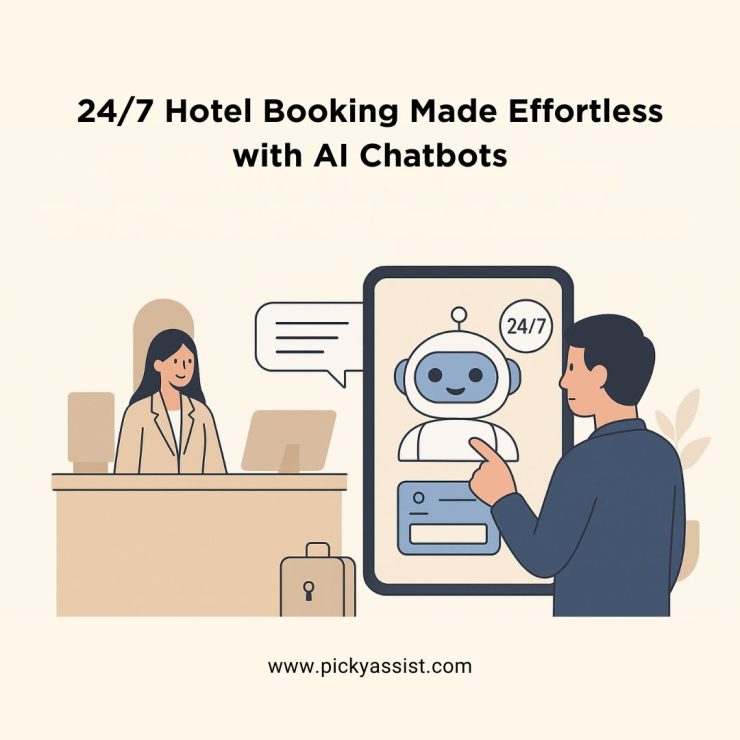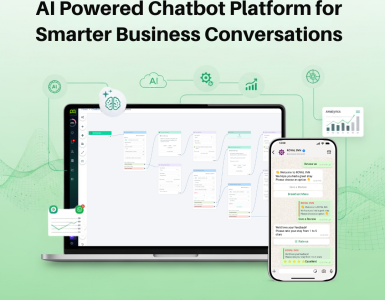If a guest arrives in the early hours at your property, bleary-eyed, hungry, and wondering whether check-in is possible or what time breakfast begins. Traditional reception is quiet. But instead of waiting, they open the hotel’s app or messaging window and a friendly digital assistant appears. At that moment the guest uses a chatbot for hotel booking, gets instant confirmation of their room ready-time, and is offered a late-night snack upgrade at a special rate. That one interaction elevates the experience, prevents frustration and starts the stay off right.
In modern hospitality, that scenario is increasingly the norm rather than the exception. Let’s explore how this technology is reshaping the industry and why hotel operators cannot afford to ignore this wave.
Why Does the Hospitality Industry Need a Chatbot for Hotel Booking?
Guest expectations have changed
Travellers now expect real-time, convenient support. Over 58% of guests believe that artificial intelligence can improve their hotel stay experience. Meanwhile, approximately 80% of hotels use or plan to use AI like virtual assistants to present personalized offers.
Operational pressures are rising
Staffing shortages, high guest volumes, language diversity and round-the-clock demands mean hotels face mounting pressure on service teams. A hotel booking chatbot (or hotel reservation chatbot) can relieve much of that load by handling routine queries, freeing human staff to focus on high-touch tasks.
Direct bookings and revenue
Automation doesn’t just reduce cost, it boosts revenue. Studies show that AI and conversational assistants in hospitality can capture more direct bookings and increase upsell/cross-sell opportunities.
Given these drivers, it’s no surprise that implementing a dedicated chatbot for hotel booking (to support the guest’s reservation journey) is becoming a strategic imperative rather than a nice-to-have.
What a Chatbot for Hotel Booking Actually Does?
1. Real-time reservation support
A well-configured system allows a potential guest to ask “Do you have a double room for tomorrow?” and the chatbot checks availability, presents rate options, handles payment and issues confirmation, often in under one minute. This functions as a hotel booking bot embedded in the website, app or messaging channel.
2. 24/7 guest assistance
Unlike a human front-desk that may close or be less responsive late at night, a hotel chatbot remains available around the clock. Many guest questions (check-out times, WiFi password, nearby restaurants) can be handled automatically. According to industry research, chatbots can take care of roughly 80% of guest inquiries.
3. Personalised engagement & upselling
Once integrated with the hotel’s CRM guest profile data, this assistant becomes much more than a FAQ tool. It can suggest room upgrades, spa bookings, dinner reservations or late check-out based on what the guest has done previously or currently displays interest in. This is a significant feature of AI chatbots in hospitality industry frameworks.
4. Multilingual & inclusive support
International travel means diverse guest languages and needs. Advanced chatbots handle multilingual conversations, streamlining communication across geographies and reducing staffing burden for translation or arbitration.
5. Insights & analytics
Every interaction is data. A good hotel chatbot solution collects insights, peak inquiry times, guest sentiment, popular room types, service gaps, and helps a hotel optimize its marketing, operations and guest experience.
Role of Chatbot for Hotel Booking in the Guest Journey
- At initial visit: a guest lands on your website and interacts with a chatbot for hotel booking to check availability and rates.
- During pre-arrival: the guest uses the same assistant to confirm special requests, arrange airport pick-up and ask about amenities.
- At stay: the bot transitions to service mode, room service, spa booking, local suggestions, acting as a digital concierge.
- At post-stay: follow-up via the assistant for feedback, upgrades for next stay, loyalty outreach.
Benefits for Investing in a Chatbot for Hotel Booking
Here are concrete metrics from the research:
- Hotels using these tools report 30-40% reductions in operational cost thanks to automation of repetitive tasks.
- Approximately 70% of guests find chatbots helpful for simple inquiries though prefer humans for complex ones, indicating effective division of labour.
- About 40% of travellers ask for price quotes when interacting with AI reservation agents, helping convert more leads.
From a business-owner’s perspective, deploying a hotel booking chatbot (or adopting a platform like Picky Assist with smart-replies and conversation flows) can:
- Increase direct bookings (avoiding third-party commissions)
- Improve guest satisfaction scores via faster responses
- Provide scalability (service at 3 am same as 3 pm)
- Support upselling through contextual prompts
- Deliver data-driven insights for marketing and operational refinement
Implementation Best Practices: How to get things right?
Choose the right platform & integrate deeply
Select a hotel chatbot solution that integrates smoothly with your CRM, booking engine and communication channels (web, WhatsApp, Messenger). Without that backbone, you’ll end up with disconnected conversations.
Define guest-centred conversation flows
Your bot should reflect real guest language and contexts. Use flows that cover: availability check, booking, special requests, amenities information, upsell offers. Avoid forcing the guest into strict scripted returns, they’ll leave.
Balance automation with human-touch escalation
While automation handles routine tasks, always ensure there’s a seamless hand-off to a human for more complex or emotion-sensitive issues. This ensures the UX is empathetic.
Monitor, iterate, personalise
Use analytics to monitor what questions are asked, where drop-offs occur, which offers conversion. Use those insights to refine your bot. Over time, treat your bot as a constantly-improving digital team-member.
Promote the chat channel
Make sure your guests know the bot is available: emphasise via website banners, pre-stay emails, in-hotel signage. 24/7 guest assistance is a USP; use it.
Use Case: Picky Assist as an Enabler
If you select Picky Assist, you gain access to smart-reply logic, multi-channel messaging and plug-ins tailored for hospitality. When combined with a well-architected hotel reservation chatbot, this offers entire guest-journey automation from booking to post-stay feedback. The benefits: faster lead capture, more direct bookings, fewer guest service bottlenecks, and improved guest satisfaction.
Addressing Challenges & Risks
- Robotic interactions: Guests will notice if the conversation feels unnatural. Some research shows bots still struggle with jargon or complex requests. So manage and set your conversations accordingly.
- Integration complexity: Without proper data and system connectivity, the bot may respond with incorrect information or frustrate guests.
- Language/cultural nuances: Multilingual support is necessary but must capture context and tone. A mis-reply in the wrong language may erode trust.
- Guest preference: Some guests simply prefer human contact for hospitality—they may see bots as impersonal. Balancing is key.
Conclusion
The era of “set and forget” reception desks is ending. The guest journey now extends across messaging platforms, mobile devices and chat interfaces. Your guest expects immediate, personalized service. A well-executed chatbot for hotel booking a strategic enabler. It offers 24/7 guest assistance, smooth reservation workflows, operational savings, enhanced guest satisfaction and increased direct bookings.
For hotel owners and operators willing to lean into it and to partner with a modular platform like Picky Assist the future is clear. It’s because they have got the perfect digital assistants for the first point of contact for guests. The key differentiator will not be that you have a bot, but how human-centred, integrated and personalised that bot is. With this approach, your brand will stand out in an increasingly connected, expectation-driven marketplace.
FAQs on Chatbot for Hotel Booking
What is a Chatbot for Hotel Booking and how does it work?
A hotel chatbot (sometimes called a hotel booking bot or hotel reservation chatbot) is a software-driven assistant embedded in a hotel’s website, app or messaging channel. It uses natural language processing and predefined workflows to interact with guests checking availability, answering FAQs, enabling bookings, upselling services and handling guest requests in real time.
Can a chatbot for hotel booking handle multilingual guests?
Yes, Modern solutions support multilingual interaction, meaning your guest from Japan or Germany can converse in their native language. This improves accessibility, guest satisfaction and global appeal.
Does a chatbot for hotel booking replace front-desk staff?
No. While the AI chatbot handles routine queries (which can represent up to 70-80% of interactions) frontline staff remain essential for complex guest issues, personal guest relations, and delivering the human touch that defines hospitality.
How soon will hotels need to adopt chatbot for hotel booking in the hospitality industry?
Many hotels already are. Around 80% of hotels are using or planning to use AI-driven assistants. Delaying adoption risks falling behind competitors in guest experience, operational efficiency and revenue capture.







Add comment